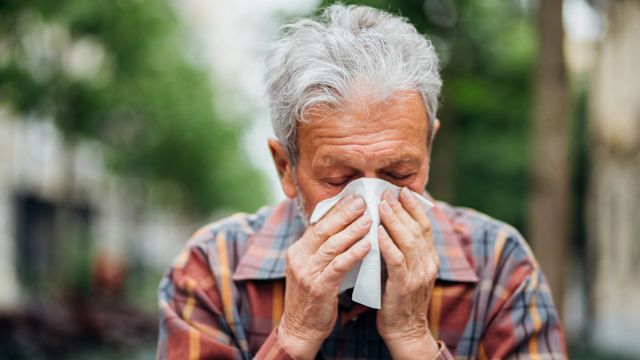Updated on October 27, 2025
Respiratory syncytial virus (RSV) is a common virus that causes respiratory infections. In most cases, RSV infections only cause mild illness similar to an average cold.
However, RSV can also cause severe respiratory illness. Infants and people with existing health conditions are at higher risk for these severe infections. Older adults are also at an increased risk—each year, RSV infections result in tens of thousands of hospitalizations and thousands of deaths among adults over the age of 65.
What makes an RSV infection severe?
As with other respiratory infections, the difference between a mild RSV infection and a more severe RSV infection depends on the section of the respiratory tract that is infected—the upper respiratory tract or the lower respiratory tract.
- Upper respiratory tract infections. The upper respiratory tract includes the nose, sinuses, mouth, and throat. Infections in the upper respiratory tract can cause discomfort—sometimes, a good deal of discomfort—but are not a serious health concern for most people, and treatment will focus mostly on relieving symptoms or shortening the duration of illness. However, upper respiratory tract infections can spread to the lower respiratory tract and become something more serious.
- Lower respiratory tract infections. The lower respiratory tract refers to the parts of the respiratory tract located in the chest—the bronchial tubes and the lungs. Infections become more serious when they spread into this area of the body. A lower respiratory infection can make it difficult for a person to breathe and carries a significant risk of serious complications when untreated or undertreated. Examples include bronchiolitis and pneumonia, which are both associated with RSV.
Why are older adults at increased risk for severe RSV?
There are two main reasons why older adults are at an increased risk for severe RSV infections. One is that the immune system weakens with age and becomes less effective at responding to infections. The term for this is immunosenescence.
Immunosenescence is also believed to be one of the reasons why many diseases are more prevalent among older adults. This includes cardiovascular disease and chronic obstructive pulmonary disease (COPD)—two conditions that also put a person at higher risk for severe RSV infections.
Severe RSV infections can also worsen the severity of conditions like COPD, congestive heart failure, and asthma.
How can older adults protect themselves against RSV?
There are several strategies that can help people of all ages avoid RSV and other pathogens that cause respiratory illness. These precautions include handwashing (warm water, soap, and at least 20 seconds), avoiding contact with people who are sick, minimizing your time in contagious settings like crowds, and wearing a mask if you are going to be in a crowd.
It’s also important to stay up to date on healthcare appointments (including recommended vaccinations) and prioritize a healthy lifestyle. Both can benefit your overall health and your immunity. Also talk to your healthcare provider about RSV vaccinations—two vaccines were approved by the U.S. Food & Drug Administration in the spring of 2023.
What should you do if you have RSV symptoms?
If you have symptoms of a respiratory illness, avoid contact with other people, especially infants, young children, and other people who are at high risk for a severe infection.
If you are at high risk for a severe RSV infection and are experiencing RSV-like symptoms, see a healthcare provider. Your healthcare provider can order tests to determine if the illness is being caused by RSV (or something else) and prescribe an appropriate treatment based on your symptoms, your overall health, and your risk of severe illness.






